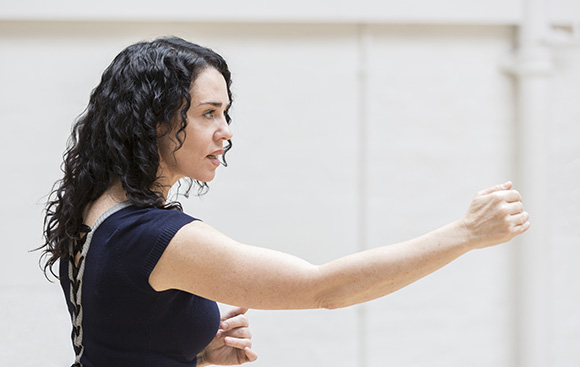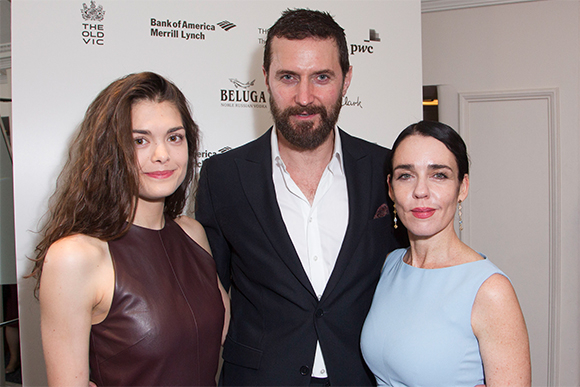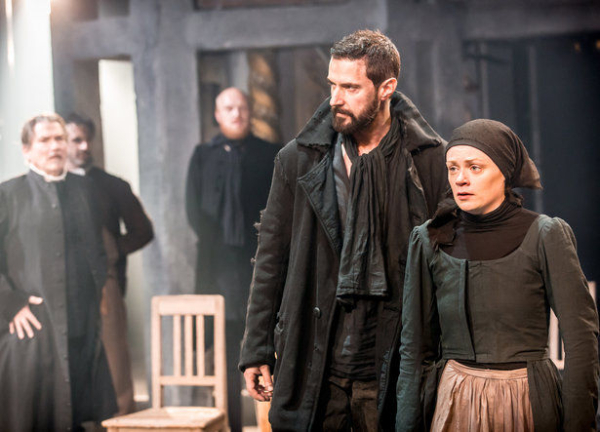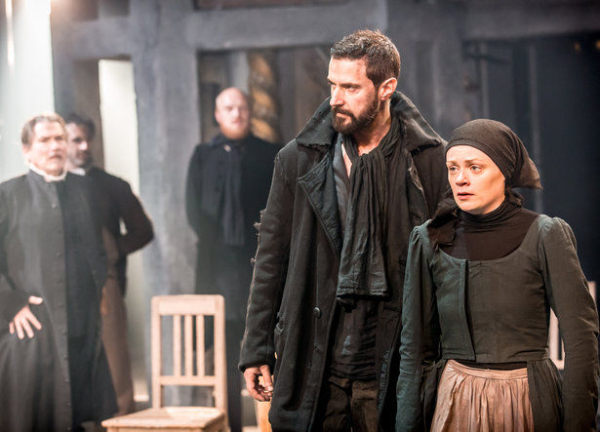Yaël Farber on directing The Crucible: 'It's only in the darkest stories that you see glimmers of heroism'

© Johan Persson
And three of those plays – A View from the Bridge, All My Sons and now The Crucible – have been seen in London within a few weeks of each other. Is there any reason why this should be so, or is it merely a coincidence?
Yaël Farber, the South African director who has stunned Edinburgh and London audiences with her red hot transcription of Miss Julie and her lacerating account of the fatal gang-rape of a female medical student on a Delhi bus, Nirbhaya, is responsible for The Crucible at the Old Vic, and pinpoints the timeless dramatic function of these plays:
"I believe in what Yeats called the spiritus mundi, our individual participation in one governing, vast intelligence, and that arguments arrive in the collective awareness and become necessary at specific times. The Crucible will never become irrelevant; and if it ever does, we can ascend to the next level as human beings. It becomes timely when the human consciousness turns to a sort of self-searching."
While Miller wrote the play in the wake of the "reds under the beds" witch-hunt of Senator Joe McCarthy, he always claimed it was not intended merely as a response to that scare, any more than he intended All My Sons as a plea for the better inspection of aeroplane parts or A View From the Bridge as an attack on the immigration bureau.
As Farber points out, Miller was already disillusioned with Marxism when the hearings began. His objection to McCarthyism was that one's private conscience had become a state matter, and that is the metaphor in the great kitchen scene between John and Elizabeth Proctor in The Crucible.
And it's impossible to contemplate the play today in Britain, let alone see it, without thinking of the judicial processes currently underway, conducted against popular entertainment figures, in an attempt to comply with a public mood of vengeful indignation over alleged sexual abuse. "Is the accuser always holy now?" asks John Proctor, as slander becomes the weapon of opportunism.
It's because Miller, like Ibsen, deals in life-lies and our shared moral frailties that he touches us so deeply in his best plays. The Open Air production of All My Sons suited the play's back garden and decorated it with a Norman Rockwell-like poster of an idealised family in a white clapboard house. That material prosperity is built on the sand of Joe Keller's suppressed guilt: in allowing the defective plane parts to be fitted he sent young men to their deaths and let his partner take the blame.
Such a moral imbroglio is never going to be irrelevant, less so with the added ingredient of direct family involvement and the secret of Joe's son's suicide. Similarly, Eddie Carbone's act of betrayal in a close-knit Brooklyn community sheltering the Sicilian immigrants in A View From the Bridge is linked to a complicated emotional obsession with his own niece.
“I’m always suspicious when someone describes a piece of theatre as universal”
“I’m always suspicious when someone describes a piece of theatre as universal”
The timelessness of that tragic dilemma was further underlined at the Young Vic with a stage stripped of all furniture save the single chair that Marco raises ominously above Eddie's head; this transformed a usually awkward moment in a naturalistic production to a powerfully poetic one in Ivo van Hove's mythic staging.
Farber promises no such gestural refinement at the Old Vic: "I'm always suspicious when someone describes a piece of theatre as universal. You deal with the detail, and that dissolves the differences we construct about being different from other people. Actors take action in the community so we can know ourselves better, I really believe that."
But surely the post-apartheid transplant of Miss Julie, with the background to the fateful encounter between mistress and servant altered from Midsummer Eve to South Africa's Liberation Day (and staged as full-on sexual congress similar to the kitchen table scene in The Postman Always Rings Twice), was a move in the opposite direction, an appropriation for a specific interpretation?
"There are countless re-makes of Miss Julie. What I saw at first was the genius device of a man and a woman with very different roles in society having sex one night and finding a way to explain to one another where their respective sections of society are heading; I also wanted to speak about South Africa and land restitution, stolen mothers, and so on.
"But with The Crucible, the play's an allegory already, so why re-write it? What happened with a bunch of folk in Salem in the 17th century is a very tiny chapter; it's not about eight million, or 18 million, people in a wave of genocide.
"Nor do I see the accusatory girls in the play as the problem. They are symptomatic boils breaking out on the body of a sick society. Two dozen people were hanged, but Miller was weaving inside that the capacity to see how these things begin, and how far they can go when people believe they have righteousness on their side."
John Proctor, played at the Old Vic by Richard Armitage, finds the courage to die rather than confess a guilt he does not have. But he will admit past sins in order to save his wife and preserve his own good name. There's nothing here we don't recognise, or respond to, in our own lives today. As Farber insists, we need these stories to gain strength for our own.
"People say that my work expresses a dark world view. In fact, I have a restorative world view because I believe, with Arthur Miller, that it's only when you look at the darkest stories that you can see the glimmers of heroism and the possibilities of the reconstitution of the human being."
The Crucible is currently in previews at the Old Vic, ahead of press night on 3 July 2014. It continues until 13 September – don't miss our WhatsOnStage Outing on 16 July













